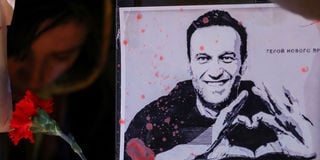Russian opposition leader Alexei Navalny dies in prison aged 47

A woman attends a vigil in memory of Russian opposition leader Alexei Navalny in front of the Russian Embassy in Yerevan, Armenia February 16, 2024.
What you need to know:
- Navalny had been by far the most prominent opposition leader since coming to international prominence during street protests in 2011, and some supporters had believed he would eventually walk free and become Russia's leader.
The death of Kremlin critic Alexei Navalny deprives President Vladimir Putin's opponents of their most formidable leader and the man who, for some, embodied hope of a better future in Russia.
The Russian prison service said Navalny, 47, collapsed and died on Friday after a walk at an Arctic penal colony, a statement his allies and wife could not confirm.
Navalny had been by far the most prominent opposition leader since coming to international prominence during street protests in 2011, and some supporters had believed he would eventually walk free and become Russia's leader.
His death, if confirmed, leaves the scattered groups that oppose Putin without a figurehead, and no obvious candidate to try to turn any discontent over his demise into mass protests.
"This death is about all of us," said Andrei Kolesnikov, senior fellow at the Carnegie Russia Eurasia Centre. "About an indifferent society. About reckless cruelty. About the loss of hope."
"Now our supreme commander has no competition - he is now the Solus Rex, the lone king," he said.
Prosecutors warned Russians against participating in any mass protests in Moscow.
Police watched as some Russians came to lay roses and carnations at a monument to victims of Soviet repression in the shadow of the former KGB headquarters on Moscow's Lubyanka square.
At a vigil in the Georgian capital Tbilisi, where many Navalny supporters have found refuge, hundreds of anti-Kremlin emigres picketed the city's closed Russian embassy.
Anastasia Panchenko, a former member of Navalny's team in the southern Russian city of Krasnodar, wiped away tears as she spoke of the man she had hoped would become her president.
"We all believed he was strong, that he’d definitely cope with this (prison), that we’d build a wonderful future Russia, that he’d be president, that everything would be okay," she said.
An 'alternative' to Putin
Though his approval ratings were dwarfed by Putin's, Navalny offered some urban, educated Russians an alternative to the country's veteran paramount leader.
Russia's opposition is in disarray as Putin prepares for an election in March which opposition groups call an "anointment" and will keep him in power until at least 2030.
Putin faces three other candidates whose job, opposition activists say, is to lose. The authorities have cracked down on what remains of Russia's independent media.
Russian officials cast Navalny as a criminal and extremist who was a puppet of the CIA, which they say wants to sow chaos in an attempt to rip Russia apart and steal its vast resources.
Opponents of Putin are scattered throughout Europe and the United States. Those still in Russia are either in prison or so scared that they remain mostly silent.
"It’s very hard to see who else would fill the role of Navalny, controversial though it was," said Keir Giles, a senior consulting fellow of the Russia and Eurasia Programme at Chatham House in London.
"He has been treated as a figurehead for the Russian opposition, and meanwhile of course, President Putin and the central Russian authorities have worked very hard to ensure that no similar figure emerges, with either the kind of backing that he had within Russia or the popularity abroad."
"So, no, there is no obvious candidate for replacing that central figure as a representative of the Russian opposition," Giles said.
Prison 'dangerous' for Putin foes
Navalny earned admiration from Russia's disparate opposition for voluntarily returning to Russia in 2021 from Germany, where he had been treated for what Western laboratory tests showed was an attempt to poison him with a nerve agent.
The Kremlin denied trying to kill him and said there was no evidence he was poisoned with a nerve agent.
"Navalny emerged as a seminal and historical figure, embodying an unyielding anti-Putin political stance and representing the most substantial alternative to Putin's regime since 2000," said Tatiana Stanovaya, of the R.Politik political consultancy.
She said Putin feared Western meddling in Russia around the election, and that this would make him take a "more hawkish, more repressive approach to any hostile manifestation."
"One by one the state of Russia gets rid of its best people, gets rid of people who can speak the truth for power," said Nina Khrushcheva, professor of international relations at the New School in New York.
The opposition ranges from Western-oriented liberals to hardline communists and radical nationalistic or even monarchical supporters of a reborn Russian empire.
Some opposition activists are concerned about two of the more prominent Putin opponents - Ilya Yashin, who is serving an 8-1/2 year term for discrediting the armed forces, and Vladimir Kara-Murza, serving a 25-year sentence on a treason charge.
Russian nationalist ex-militia commander Igor Girkin, who accuses Putin and the army brass of failure in the war in Ukraine, was convicted by a Moscow court last month of inciting extremism and jailed for four years.
"We all already understood that places of detention can be dangerous to life and health," Strelkov's wife said. "Especially for those objectionable to the system."





